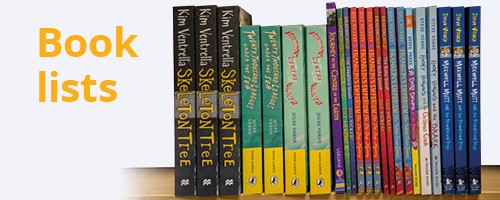Schools please note: due to the summer holidays we will automatically hold all school books and furniture orders due between Wednesday 16 July and Monday 1 September 2025. Delivery will resume from Tuesday 2 September 2025. If your school remains open for deliveries during the summer and you would like to receive your order during this time, please get in touch in advance by calling 0121 666 6646 or emailing hello@peters.co.uk.
For help, advice and telephone ordering call our team on 0121 666 6646
Are you sure you wish to delete this basket?()
This action cannot be undone.
Sorry, something went wrong
Please report the problem here.
R.L. LaFevers Q&A: Theodosia and the Serpents of Chaos

February 28th 2022
Robin LaFevers is an award-winning American children's book writer from California. She has had a life-long love of animals, which often make appearances in her novels, and she admits to a belief in the magical, which is also a driving element of stories such as Theodosia.
The central character in the Theodosia series, Theodosia Throckmorton has an extraordinary ability: she can sense ancient magic. This is most useful, as she spends her life fighting curses in the London Museum of Legends and Antiquities, where her father is head curator of a vast collection of Egyptian artefacts and mummies. A new series based on the Theodosia books is set to air later this year.
Can you tell us a bit about Theodosia and how you came to write this exciting series?
The germ of the idea that ultimately turned into Theodosia was that ancient artefacts still had magical power clinging to them and there was a lone girl who had the ability to sense this. Next, I wanted her to have a grand, sweeping adventure—like so many boys in children’s literature get to have. I let myself delve backwards in time to when I was eleven and what things fascinated me, what my frustrations were, where my sense of powerlessness came from, and in turn, what provided me with a sense of power. Those all kind of percolated in my head until one day, Theodosia took shape and began talking to me. That’s when I knew the idea would turn into my next book.
What was the most enjoyable part about writing these books?
I think it was Theodosia herself that was the most enjoyable part of this whole process. Sometimes, once a character comes to you they become their own self and just take off. Theodosia was very much like that. I never knew what she’d do next or I would find myself surprised by her thinking or daring. It was like discovering a new best friend I couldn’t wait to spend time with.
As I got to know Theo better, I also found myself drawn to showing how it was her perceived weaknesses that ended up being her greatest strengths. So while Theo gets in trouble from her parents for being too sensitive or having too much imagination, it is also the very thing that allows her to save the day. I think that happens a lot in real life, actually, our weaknesses can sometimes end up being our best qualities, if we learn how to manage them.
What qualities do you have in common with Theodosia? And which of her traits would you like to borrow?
So many! Her insatiable curiosity and inquisitive (often much to the annoyance of those around us). I, too, was hyper sensitive as a kid, always sensing things the adults around me didn’t seem to notice. I share Theo’s love of books and libraries, museums and ancient things. And many of her quirky observations are often based on thoughts of mine that I’ve never had the nerve to say out loud.
I would love to have Theo’s self-confidence! Actually, I wish for every child, that same level of self- confidence.
Both the Theodosia series and your His Fair Assassin YA series are deeply rooted in history. Did you do a lot of research, and how do you approach the merging of history and fiction?
So. Much. Research! In fact, my husband teases me that I write books so I have an excuse to do research. And while that is not (quite) accurate, I do adore research. I have ever since I was little. I love walking into libraries and museums and feeling all that ancient knowledge sitting on the shelves, right at my fingertips.
My actual research process is kind of all over the place. I do some background research first, the stuff I’ll need to know to understand what sort of setting I’ll be creating for the book, what the constraints are, how it differs from our world, that sort of thing.
Because the book was going to concentrate on Egyptian magic and ancient artefacts, I wanted to set the book during the heyday of Egyptology—which was the late 1800’s and early 1900’s. That was also a time when there were a lot of secret societies scuttling about, trying to learn all they could about ancient mysteries. Since the Theodosia books involved both, it seemed the logical choice.
I wanted to model the Museum of Legends and Antiquities on the British Museum and, since England had acquired so many Egyptian artefacts, it seemed to make sense that there would be an organization like the Brotherhood of the Chosen Keepers whose mission was to keep an eye on the cursed ones.
One of the trickier aspects was trying to be somewhat true to the thoughts and views on archaeology from 1907 rather than those we have today. To try and separate what we’ve learned since then from what we knew at that time. There are huge differences in our levels of understanding and our attitudes. It’s hard though, because we also know now how incorrect some of those attitudes were. I compromise by having Theo’s slightly more evolved attitudes come from her youthful naiveté and general fair mindedness.
When you sit down to write, what do you need around you?
When I sit down to write, I absolutely MUST have at least four different notebooks (one for scene ideas I’ve jotted down, another for character sketches or profiles I’ve done, a third for worldbuilding, and a fourth for research notes), a pile of pens, Google, and my laptop. I’m a hybrid writer in that I switch back and forth between typing on my laptop and writing by hand. For fast, action-based scenes, the laptop works best, but when I’m writing character driven scenes, or need to go deep inside the character to better understand them, I write by hand.
Oh, and silence. I need absolute silence with no distractions.
Do you have any advice that you would give to someone who wants to be an author?
If you want to be a writer, the first thing you should do is read. Read often and read widely. Then write, study, then write some more.
After you’ve done all that, read some more, this time with a more critical eye. Not critical as in harsh or judgmental, but as in discerning. Pay attention to what techniques the author is using, the balance of narration to dialog, where your attention lags, what parts of the story grip you. Take notes.
Now write some more with all that discernment percolating inside you.
Be willing to revise. And be willing to put the work aside for a few weeks in order to see it more clearly. You’ll be surprised at how much more the flaws stick out once you’ve had a bit of time away from it. (I have a TON of writing advice and mini workshops on my Instagram feed for those who want more in-depth answers.)
And finally, what was your favourite book as a child?
The Secret Garden. It was my first introduction to an ‘unlikeable’ heroine and I adored reading about someone who was sullen and imperfect. It allowed me to feel like I could be the heroine of a story someday.
Theodosia and the Serpents of Chaos is out this week.









